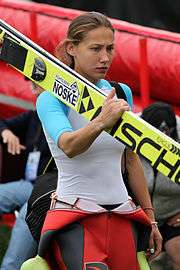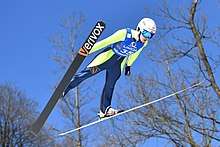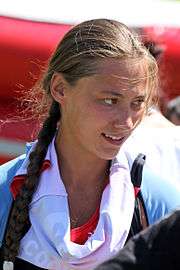Irina Avvakumova
Irina Andreyevna Avvakumova née Taktayeva (Russian: Ирина Андреевна Аввакумова (Тактаева); born 14 September 1991) is a Russian ski jumper. She is a multiple-time Russian national ski jumping champion, and won the women's Continental Cup season in 2012/13. At the 2013 Winter Universiade in Predazzo, Avvakumova won a gold medal in the team competition and bronze in the individual competition.[1] She represented Russia at the 2014 Winter Olympics in Sochi, finishing in the 16th position. At the 2018 Winter Olympics, she became fourth. This is the best placement of any Russian Olympic ski jumper ever, and the best since 1968 (when Vladimir Belousov won a gold medal in the large hill) if the Soviet Union is included.
| Irina Avvakumova | |
|---|---|
Irina Avvakumova at the World Cup ladies ski jumping event in Hinterzarten. | |
| Country | |
| Full name | Irina Andreyevna Taktayeva |
| Born | 14 September 1991 Mysa, Gatchinsky District, Leningrad Oblast, RSFSR, USSR (now Russia) |
| Ski club | Moscow RGSH Stolitsa Dinamo |
| World Cup career | |
| Seasons | 2012–present |
| Individual wins | 1 |
| Indiv. podiums | 12 |
| Team podiums | 2 |
| Indiv. starts | 121 |
| Team starts | 5 |
| Updated on 12 March 2020. | |
Career
Early years
In 2005 Avvakumova changed from cross country skiing to ski jumping. In 2011, she took part in her first World Cup event in Lillehammer, placing 40th.



World Cup debut (2012)
In 2012 her best World Cup results are the 13th and 14th position in Zao and Hinzenbach respectively. With her Russian team she placed 11th in Lillehammer (23 November 2012). At the Summer Grand Prix Ski Jumping Final in Almaty Avvakumova won the silver medal.[2] In 2012/13 Avvakumova was the winner of the Continental Cup, taking part in four events and winning three of them in Örnköldsvik.
World Championships (2013)
In 2013, she represented Russia in the World Championships in Val di Fiemme and placed 13th in the individual ranking and 9th in the team ranking. At the Summer Grand Prix events in 2013, Avvakumova achieved top ten positions in Hinterzarten 8th and Courchevel 10th.
First world cup win (2014)
In the World Cup series Avvakumova established herself among the world's best female jumpers placing third and second at Hinterzarten.[3] On 4 January 2014 she won the World Cup event in Chaykovsky, Russia, becoming the first Russian ski jumper (both male and female) to ever win the World Cup event.[4]
Avvakumova's coaches are Konstantin Shaitanov, Roman Kerov and Roman Pashkin.[5]
World Cup
Standings
| Season | Overall | L3 | RA | BB |
|---|---|---|---|---|
| 2011/12 | 33 | N/A | N/A | N/A |
| 2012/13 | 31 | N/A | N/A | N/A |
| 2013/14 | 4 | N/A | N/A | N/A |
| 2014/15 | 11 | N/A | N/A | N/A |
| 2015/16 | 7 | N/A | N/A | N/A |
| 2016/17 | 9 | N/A | N/A | N/A |
| 2017/18 | 5 | 6 | N/A | N/A |
| 2019/20 | 19 | N/A | 28 | N/A |
Wins
| No. | Season | Date | Location | Hill | Size |
|---|---|---|---|---|---|
| 1 | 2013/14 | 4 January 2014 | Snezhinka HS106 | NH |
Higher education
Since 2009 Avvakumova has studied sports at the Moscow State Academy of Physical Education, Youth and Tourism МГАФК (Московская государственная академия физической культуры, formerly known as МОГИФК) in Malakhovka.
Private life
Avvakumova lives in Chulkovo (Чулково), a small village south east of Moscow. Her mother Svetlana (Светлана Сергеевна Тактаева) is a teacher at the СОШ №20, the local high school Irina attended.[6]
In Russian media and in several rankings, Avvakumova's maiden name Taktaeva (also Taktayeva, Russian Тактаева) is also used or rather used again. On 23 December 2011, Irina Taktaeva married Maxim Avvakumov[7] and from 2012/2013 on all rankings should have changed to Avvakumova, as did the FIS ranking. In her new VK account, however, Irina reverted to her maiden name[8] and explains that she is divorced.[9]
Irina's father's surname, Taktaev, is of Tatar origin and her father Andrey is from Izhevsk (Ижевск), but Irina herself emphasizes that she is completely Russian.[10]
| Wikimedia Commons has media related to Irina Avvakumova. |
References
- See http://www.universiadetrentino.org/stiframe1/HIDE/en/-60/Comp/DetailedScheduleByEvent?sportCode=SJX470000. Retrieved 2 January 2014.
- See http://aussenseiter-spitzenreiter.info/Joomla/index.php?option=com_content&view=article&id=487:2-platz-fuer-irina-avvakumova-beim-letzten-springen-des-sommer-grand-prix&catid=2:startseite. Retrieved 4 November 2012.
- See http://www.ladiesskijumping.com/pokaz.php?show=ps. Retrieved 5 January 2014.
- Paone, Francesco (January 4, 2014). "Irina Avvakumova beats Sara Takanashi and writes the history of the Russian leap". NeueItalia. Retrieved 4 January 2014.
- See http://www.team-russia2014.ru/person/69.html Archived 2013-09-16 at the Wayback Machine. Retrieved 16 August 2016.
- "История продолжается..." (in Russian). Chulkovo Sport School. Retrieved 3 January 2014.
- See http://www.skijumpingrus.ru/fednews/news_458.htmlRetrieved 2 January 2014.
- See http://vk.com/smrdinka. Retrieved 2 January 2014.
- See http://ask.fm/smrdinka. Retrieved 3 January 2014.
- See also http://ask.fm/smrdinka. Retrieved 3 January 2014.